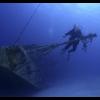Carrying weight when you don't need to is less safe - so I choose not to except with students when I need the spares and the extra "muscle" to keep students from bolting.It's interesting to see a number of experienced divers in this thread using little or no dumpable weight.
Does this mean that dumpable weight is an overrated safety device? (kind of like floating airplane seat cusions?)
Ironically, there are documented cases where the diver in distress did NOT dump their dumpable weight. So I'd characterize it as an UNDERUTILIZED device, not an overrated one.
Strong OPINION follows.
In our continuous attention to avoiding DCS, I think some divers are pre-occupied with not coming up too fast, so dumping weights when a situation below would suggest it, becomes a last resort thought. I'll repeat myself - we can fix bent. We can't fix dead.
On the surface, the distressed diver goes from elation to panic as they discover they're swallowing waves, lacking the energy to swim, can't see the boat etc., and then they fail to release their weight.





















